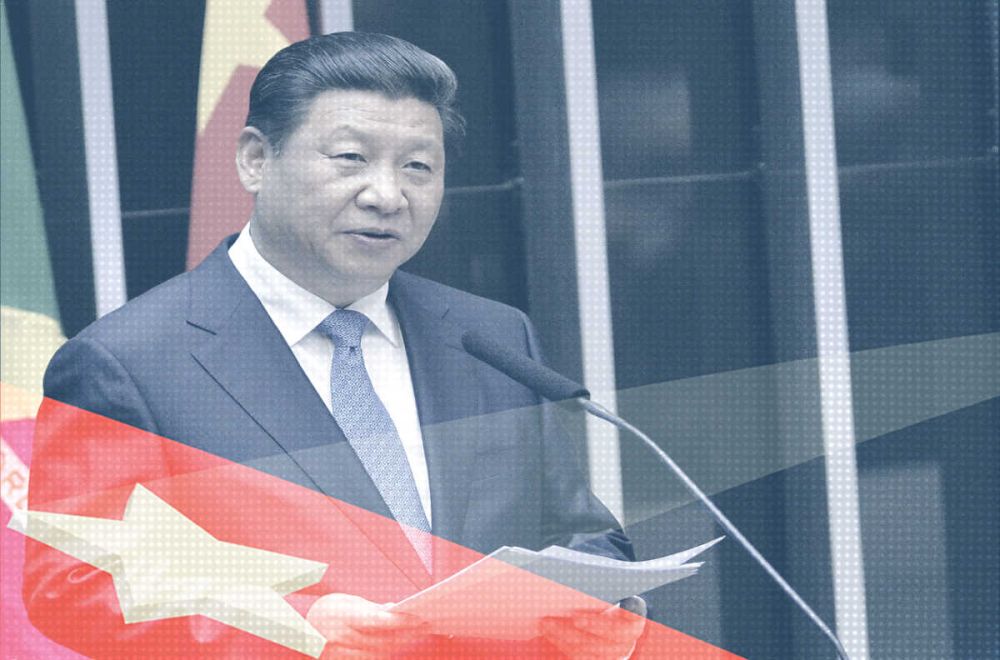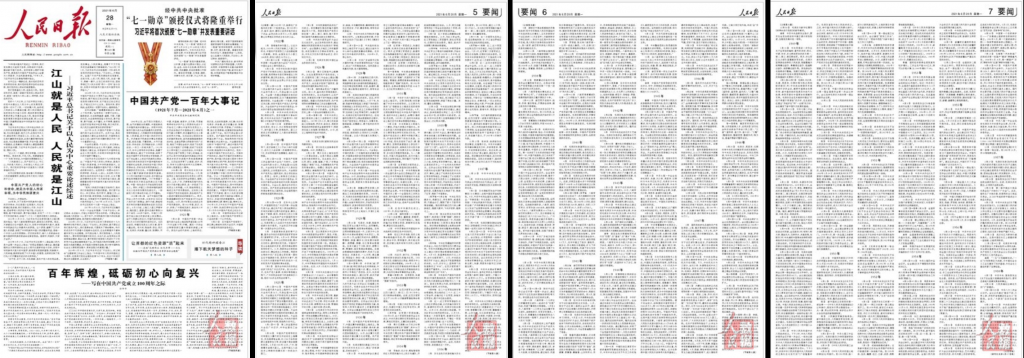
Celebrated with great fanfare last week, the Chinese Communist Party’s centennial and Xi Jinping’s “important speech” left behind a wealth of clues to be picked over in the coming weeks, helping to answer the question: What core values define Xi Jinping’s CCP in the 21st century?
Beyond the general secretary’s July 1 speech, however, one document that has received less attention is “Major Events in 100 Years of the Chinese Communist Party” (中国共产党一百年大事记), a chronicle of the Party’s most important milestones over the past century, organized by year and date, that was published in the People’s Daily on June 28. The document, featured on the newspaper’s front page, sprawled through several interior pages.
“Major Events” is the most important recent official text we have on the CCP’s contemporary view of its history. And several omissions from that history should be noted as glaring signs of shifting priorities.
How can we know there have been omissions? When the Party commemorated its 90th anniversary back in 2011, a similar list of major dates and developments was compiled and published in the Party’s flagship newspaper. This year’s document is more than just an update that brings the chronicle up through June 2021. It is also a revision of the previous chronicle.

Political Reform
For years at CMP, we have followed the official discourse on the topic of “political reform” (政治体制改革), including in 2011, when Wen Jiabao mentioned the urgency of political reform during a speech to the World Economic Forum, capping a series of such mentions in 2010. Even if there were few signs of real action on reform of the political system – such as introducing greater measures for “intraparty democracy” – the phrase could be traced through official discourse. In the Xi Jinping era, however, the term has almost entirely vanished.
It is perhaps not surprising to note, then, that “political reform” has been scrubbed from the most recent version of “Major Events,” having appeared in two separate entries in the 2011 document.
Ten years ago, an entry for August 18, 1980, in “Major Events” noted that Deng Xiaoping had given a speech called “Reform of the Party and State Leadership System” (党和国家领导制度的改革), which had “become the programmatic document guiding the reform of our political system.” An entry for 1986 noted that on four separate dates in September and November that year, Deng Xiaoping had “spoken about the issue of political reform four times and elaborated on the necessity, main contents and goals of political reform.”
These are quite glaring omissions of Deng Xiaoping’s legacy on the question of political reform in the 1980s, and their absence, not at all incidental, reflects how the topic of political reform, pushed with some urgency, though sporadically, in the decade before Xi came to power, is now essentially taboo.
Human Rights
Over the years, quite a number of scholars have noted changes to China’s 1982 Constitution through amendments in 1988, 1993, 1999 and 2004, and these changes have often been viewed as a process of maturation. Xu Shang, a professor at the China University of Political Science and Law, noted in a 2016 volume, for example, that the inclusion in 2004 of the language “the state respects and protects human rights,” was “more evidence of the maturation of the 1982 Constitution.”
What are we to make, then, of the fact that while the 2011 “Major Events” document in the People’s Daily did make note of this amendment as a milestone adopted by the second session of the 10th National People’s Congress on March 14, 2004, this has been dropped wholesale from the 2021 version of history?
The only appearance of the words “human rights” at all in the 2021 version is an entry, shared with the 2011 version, dating back to May 1, 1941, when a document for the protection of human rights and property rights was introduced in the Shaan-Gan-Ning Border Region.
It seems difficult not to read the omission of the important constitutional amendment in 2004 as being part of a general rejection of international human rights discourse by China’s current leadership.
Civil and Political Rights
Where the international discourse on rights is concerned, the role of the United Nations is paramount. So how does the UN appear in this year’s “Major Events”?
There is mention of Dong Biwu (董必武), the communist revolutionary, attending the founding session of the United Nations in San Francisco in 1945. There is mention also of the restoration of the PRC’s “legal rights” in 1971, as it was recognized by General Assembly Resolution 2758 as the “only legitimate representative of China to the United Nations.” There is mention of various leaders, including Deng Xiaoping and Xi Jinping, attending UN sessions and giving speeches, of China’s deployment in 1992 of a 400-strong peacekeeping force in Cambodia, and of its signing in 2003 of the UN Convention against Corruption.
But one key milestone that is missing from the 2021 version of “Major Events” is China’s signing on October 5, 1998, of the International Covenant on Civil and Political Rights (ICCPR), a key part of the International Bill of Human Rights. China has indicated on a number of occasions since signing the ICCPR that it intends to ratify it, but to date it has failed to do so. The decision to drop the signing of the human rights treaty from its chronicle of key events hardly suggests the country’s leaders are ready to move forward.
As it may be helpful for researchers to do their own searches and comparisons of the 2011 and 2021 historical chronicles, we include downloadable PDF versions of both below.




















